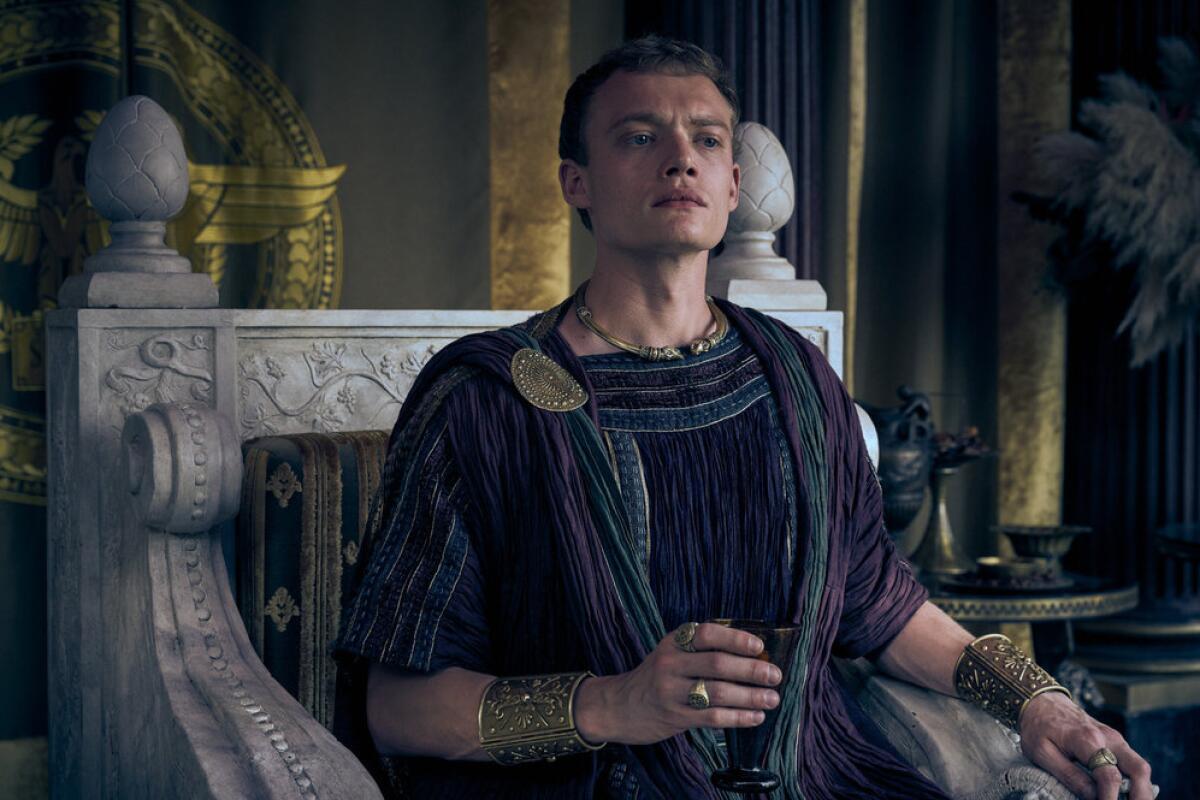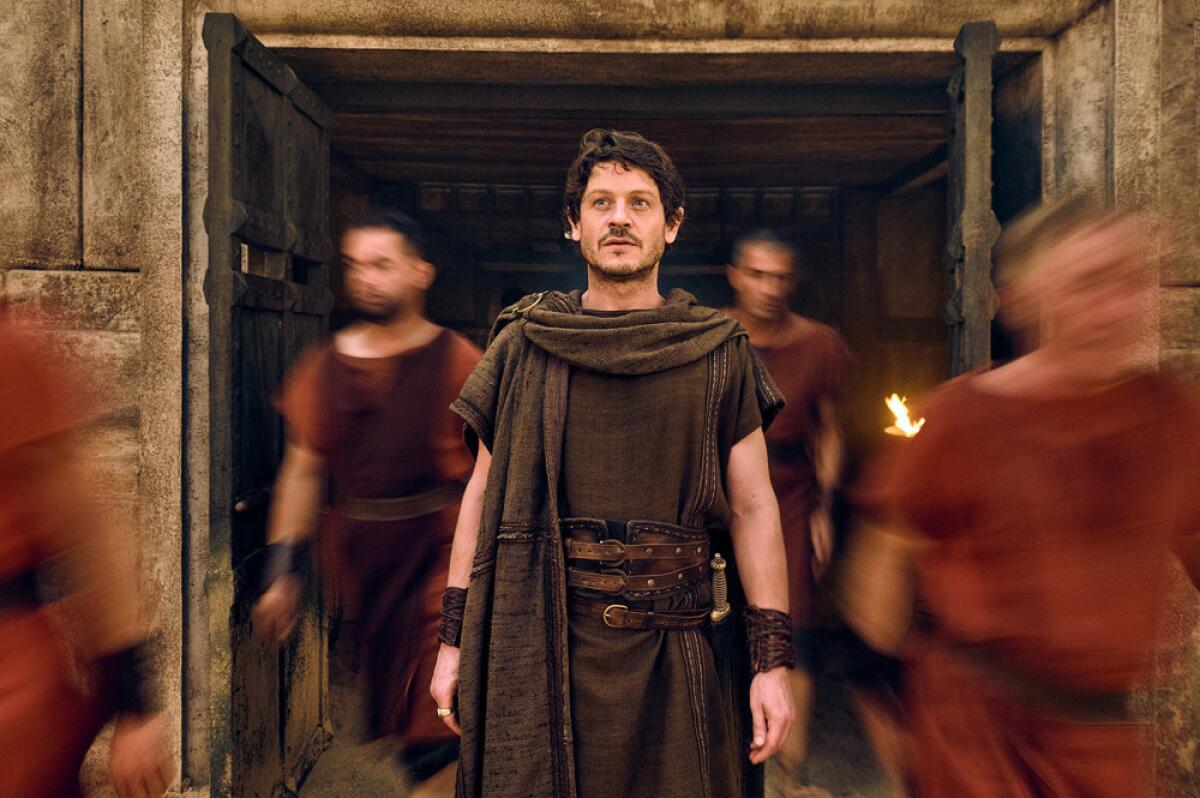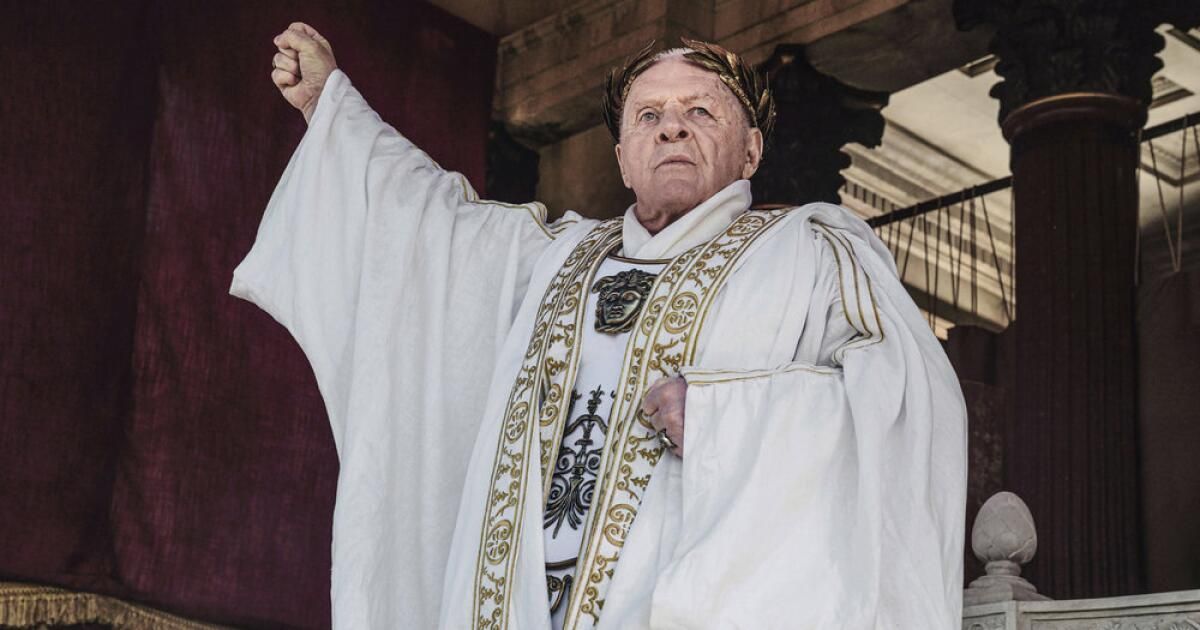I'm not much of a predictor, but it seems a safe bet that in 100 or even 500 years, in whatever entertainment medium is in vogue, someone will be making an epic of ancient Rome. The context may be different, depending, for example, on whether the audience lives in a republic or an empire, but the basic elements will remain the same: sex and violence, swords and sandals, bread and circuses, the decadent rich and the honest poor.
Filmmakers have been tapping that well since there was cinema, and the world never has to wait long for a new batch to be drawn from it. This week sees the release of the trailer for Ridley Scott’s “Gladiator” sequel, “Gladiator II” (note the numbers), and the premiere Thursday of a vigorous new Peacock series, “Those About to Die,” which covers similar blood-soaked ground — on a presumably smaller budget.
The year is 79 and “Rome, once a beacon of civilisation, is now a cesspool of corruption and decay.” Anthony Hopkins brings class to the affair as the Emperor Vespasian, who is preparing to die and is considering which of his two sons will succeed him. Stone-faced and always armoured, Titus (Tom Hughes) is a model of military rectitude, though he is controversial in Roman circles for having a Jewish girlfriend, Berenice (Lara Wolf), who is still queen; their relationship also doesn’t sit well with the enslaved Jews who have been building the Colosseum, aka the Flavian Amphitheatre, which looms in the background. His brother, the unprepossessing Domitian (Jojo Macari), is supposedly a skilled politician, though without tact or poker face. He is a walking inferiority complex, which he compensates for with random acts of violence, like a Caligula fanatic, and seems ready at any moment to erupt like Vesuvius.
1
2

1. Tom Hughes as Titus. (Low Reiner/Peacock) 2. Jojo Macari as Domitian. (Low Reiner/Peacock)
At the center of several narrative strands is Tenax (Iwan Rheon), a first-century bookmaker, whose busy betting house is one of the series’ liveliest creations—and the one I was most willing to believe. Ambitious for upward mobility in the ancient world, Tenax seeks to add a new “faction” to the four established racing stables, whose horses and drivers compete exclusively in the Circus Maximus, a giant track at the back of the imperial residence. The star of that show, and central to Tenax’s plans, is the chariot racer Scorpus (Dimitri Leonidas), the real-life Mario Andretti of the era, who refers to himself in the third person and runs a side race on a drunken spree.
Though he’s the most charming character in the series (due in large part to Rheon’s own charisma), seemingly a decent boss and good to poor children, Tenax is also a schemer, a cheat, and much worse. (The first episode opens with him having his throat slit by a debtor. “There’s no value in pity,” he’ll tell the kids who do his odd jobs.) But the filmmakers have given him an all-access pass, from plebeian back alleys to the marble halls of power, and he’s always running into people who might literally want to cut his head off without warning. Such confidence doesn’t keep him out of trouble.
Later in the series, without abandoning any of his other projects, Tenax will become an impresario, planning “entertainments” at the Coliseum: Flo Ziegfeld, if Fanny Brice and Will Rogers had to fight to the death, or if the Ziegfeld girls were to be eaten by alligators. To be sure, showbiz and the underworld have long been linked in pop culture and in real culture, and “Those About to Die” flirts with a host of genres: behind-the-scenes drama, crime story, political thriller, family drama, teen romance, softcore porn, torture porn.

Iwan Rheon plays Tenax, a charming figure who is also a schemer, a cheat, and much worse.
(Reiner Bass / Peacock)
Working for Tenax is Cara (Sara Martins), a recent arrival from North Africa. A polyglot, well-educated, with a head for numbers and a flair for innovation (and arguably the smartest person on the show), she’s followed her kidnapped children to Rome in hopes of bringing them home. Her daughters Jula (Alicia Edogamhe) and Aura (Kyshan Wilson) end up on the slave market, while her small-but-mighty son Kwame (Moe Hashim) has been roped into the gladiators’ fold, which is like a death sentence (the typical oversized monster enemy must be defeated). Norseman Viggo (Johannes Johannesson) is the friend Kwame makes at gladiator camp in one of the show’s healthiest relationships, and if I’m telling you that they’ll eventually be forced to face off in the arena (cruelty is the name of the game), you need to watch more movies.
Other prominent characters, but who by no means complete the large cast, include the wealthy Marsus (Rupert Penry-Jones) and Antonia (Gabriella Pession), who have interests in one of the factions, and at the lower end, three playful Spanish siblings (Gonçalo Almeida as Elia, Pepe Barroso as Fonsoa and Eneko Sagardoy as Andria), who have come to Rome hoping to sell their speedy Andalusian horses. Many of these people will be intermingling with each other; it's a busy show; there's a lot to keep straight.
Many aspects of this material have been tackled, from farcical comedy to arthouse cinema to trashy fare. Whereas John Milius’s 2005 HBO series “Rome” took a relatively highbrow approach, “Those About to Die” is melodrama pure and simple; the fact that it is largely produced and directed by Roland Emmerich, known for “Independence Day” and 1998’s “Godzilla,” and developed by Robert Rodat, Emmerich’s collaborator on “The Patriot” (he also wrote “Saving Private Ryan”), should give some clue as to its dramatic methods and goals. It’s not the highest road to Rome, though it’s not the lowest either. There’s some history mixed in here and an obvious attempt to fill the screen and the story with accurate period detail, though the digital effects and backgrounds tend to take you out of human reality and into a video game.
As for the sex and violence, yes, we’ve seen the frescoes and mosaics and know that the Romans had very creative erotic lives, but on streaming TV, these scenes, which appear regularly, feel tediously gratuitous. (All the naked people — more women than men, as you’d expect, and sometimes just thrown in as decoration — are, naturally, extremely attractive.) As for bloody Rome, there are fights, murders, mutilations, executions, deaths by computer-generated wild animals and multi-chariot crashes. Traditionally, such films have allowed producers to sell prurient themes under the guise of edification, while maintaining an attitude of moral superiority that would have made little sense to the people the show is about.
And while we no longer execute people in public or throw them to the lions for fun, we apparently still enjoy watching actors pretend to do it. What does that say about us?












